2017 Toyota 4Runner Tires & Services
Get Started
Complete Auto Care for Your 2017 Toyota 4Runner
-
TIRES FOR YOUR 2017 Toyota 4Runner View Tire Info GET TIRE PRICING
-
REPAIR FOR YOUR 2017 Toyota 4Runner View Repair Info SCHEDULE REPAIR
-
MAINTENANCE FOR YOUR 2017 Toyota 4Runner View Maintenance Info SCHEDULE MAINTENANCE
-
OFFERS FOR YOUR 2017 Toyota 4Runner Limited Time Tire Offers VIEW ALL COUPONS
2017 Toyota 4Runner Tires
Recommended Tires | Tire Information
2017 Toyota 4Runner Tires Sizes, Speed Ratings, and Inflation
Not sure about your 2017 Toyota 4Runner tire size? Use the following chart to find information on tire size, speed rating, and inflation.
| Trim Level | Speed Rating | Inflation in PSI F/R | Tire Size |
|---|---|---|---|
| 2017 Toyota 4Runner SR5 | S | 32 PSI/32 PSI | P265/70R17 |
| 2017 Toyota 4Runner Limited | H | 32 PSI/32 PSI | P245/60R20 |
| 2017 Toyota 4Runner TRD Pro | S | 32 PSI/32 PSI | P265/70R17 |
| 2017 Toyota 4Runner TRD Off-Road | S | 32 PSI/32 PSI | P265/70R17 |
|
2017 Toyota 4Runner SR5 Speed Rating: S Inflation F/R: 32 PSI/32 PSI |
|
2017 Toyota 4Runner Limited Speed Rating: H Inflation F/R: 32 PSI/32 PSI |
|
2017 Toyota 4Runner TRD Pro Speed Rating: S Inflation F/R: 32 PSI/32 PSI |
|
2017 Toyota 4Runner TRD Off-Road Speed Rating: S Inflation F/R: 32 PSI/32 PSI |
* Note: these models have different tire sizes depending on vehicle options.
Recommended Tires for Your 2017 Toyota 4Runner
What tires are best for a 2017 Toyota 4Runner? Check out the following tire brands and types.
 ALENZA AS ULTRA
ALENZA AS ULTRA
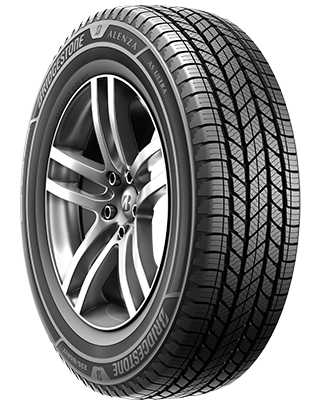
- No warranty
- All-Season
- Light Truck Tires
 Blizzak DM-V2
Blizzak DM-V2
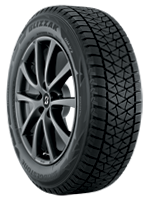
- No warranty
- Winter
- Winter
 Dueler H/T 684 II
Dueler H/T 684 II
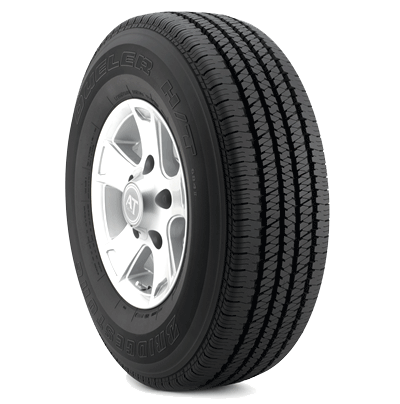
- Platinum Pact Limited Warranty
- All-Season
- Light Truck Tires
 Dueler A/T Revo 3
Dueler A/T Revo 3
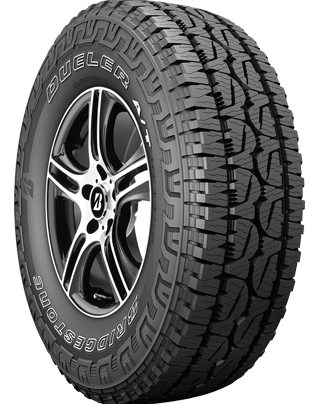
- Platinum Pact Limited Warranty
- All-Season
- Light Truck Tires
 Dueler A/T Revo 3 - LT
Dueler A/T Revo 3 - LT
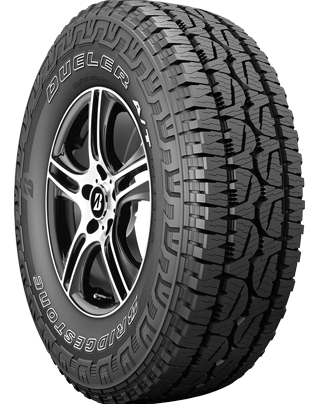
- Platinum Pact Limited Warranty
- All-Season
- Light Truck Tires
 Dueler A/T RH-S
Dueler A/T RH-S
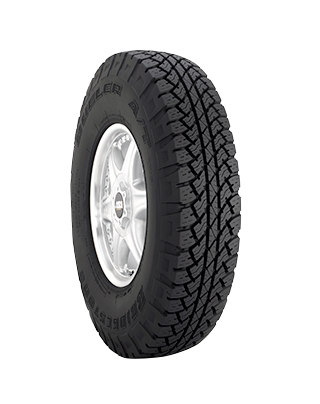
- Platinum Pact Limited Warranty
- All-Season
- Light Truck Tires
 Destination A/T2
Destination A/T2
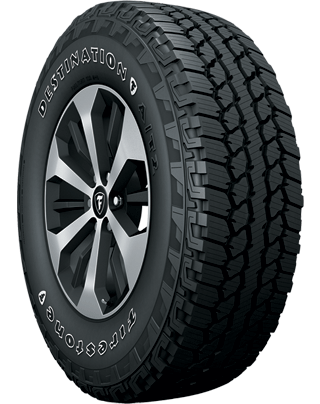
- Gold Pledge Limited Warranty
- All-Season
- Light Truck Tires
 Destination LE3
Destination LE3
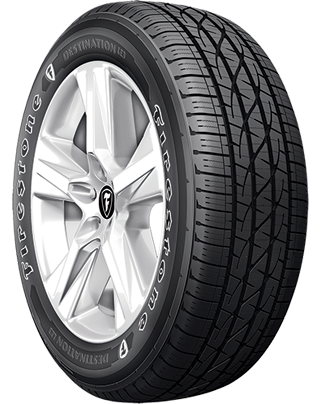
- No warranty
- All-Season
- Light Truck Tires
 Destination X/T
Destination X/T
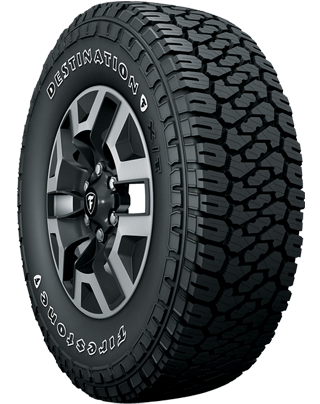
- Gold Pledge Limited Warranty
- All-Season
- Light Truck Tires
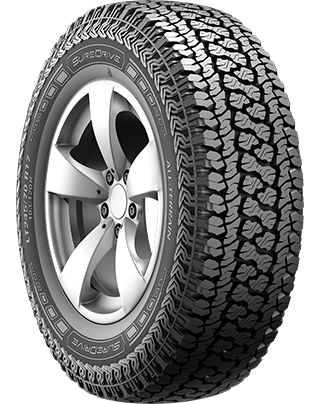
- No warranty
- All-Season
- Light Truck Tires
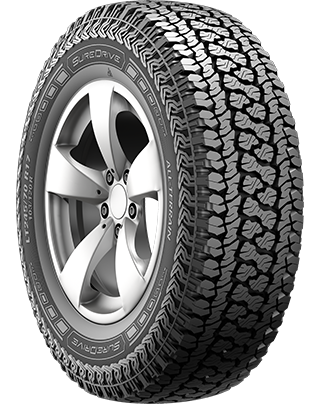
- No warranty
- All-Season
- Light Truck Tires
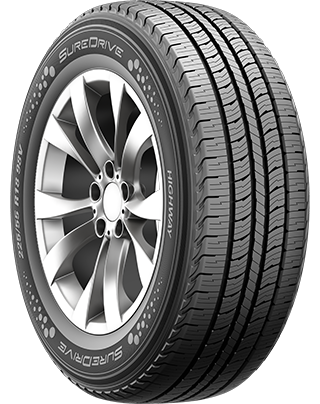
- No warranty
- All-Season
- Light Truck Tires
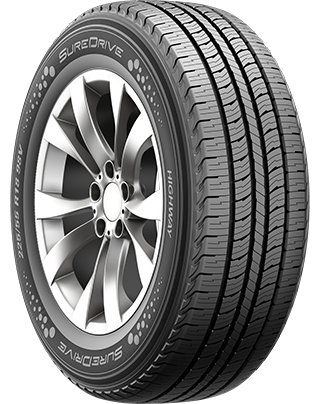
- No warranty
- All-Season
- Light Truck Tires
 OPEN COUNTRY A/T III
OPEN COUNTRY A/T III
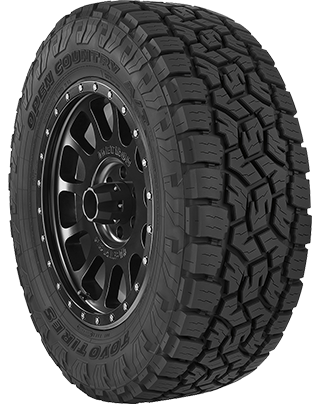
- No warranty
- All-Season
- Light Truck Tires
Choosing 2017 Toyota 4Runner Tires
Apart from finding the right tire size, you also want to think about a couple of other things when getting new Toyota 4Runner tires like which tire brands you like most and where you drive. When thinking about your driving conditions, consider where you live (mountains vs. city vs. countryside) and the kind of weather can catch you off-guard. (Watch out Tornado Alley!) Many drivers who live in states that experience all four seasons choose to purchase two sets of tires: one for summer and one for winter. Other drivers prefer the convenience of all-season tires. They make one trip to the tire shop and they're pretty much ready for rain, light snow, or sun!
Your personal driving style is the next factor to consider. If you're an avid off-roader who yearns to pioneer new paths, you have very different tire needs than a highway commuter who doesn't hit the hills very often. Talk to a tire technician at Firestone Complete Auto Care for help choosing the best tire for you, or start shopping for Toyota 4Runner tires online.
Installing Toyota 4Runner Tires
Firestone Complete Auto Care has been a leading tire provider for more than a century. We're your one-stop shop for tire installation, rotation, and ongoing maintenance! Shop 2017 Toyota 4Runner tires online and schedule an installation appointment.
2017 Toyota 4Runner Tire Q&A
-
Why does Toyota tire inflation matter? A small decrease in tire pressure can have a big impact on your driving. Maintaining proper tire pressure can help improve braking time, increase fuel economy, and boost tire lifespan.
-
What do the tire sidewall numbers mean for my Toyota 4Runner? Your tire sidewall gives you information about load carrying capacity, speed rating, treadwear, traction, and tire size. Talk to one of our tire technicians to learn how to read the numbers on your tire!
-
How do I check the tread depth on my Toyota tires? Stay on top of your tire tread depth to help avoid a dangerous drive. You can check tread depth with a penny. Hold the penny so that Abraham Lincoln is facing you, then place your penny into a tread groove upside down. If you can see the top of Abe’s head, your tread is shallow and it might be time for new Toyota 4Runner tires. Grab a penny. Hold the so that Abe Lincon's head is facing you and his hair is pointing toward the ground. Then, place the penny into a tread groove. If you can see the top of Abe’s head, your tread is shallow and it might be time for new Toyota 4Runner tires.
Repair Services for Your 2017 Toyota 4Runner
How do I learn more about auto repairs? Click on a service below to read about the types of Toyota 4Runner repairs we do at Firestone Complete Auto Care.
Get Repairs for Your 2017 Toyota 4Runner
For most drivers, the words “car repair” don’t exactly spark excitement. But we work to provide you with a different experience at Firestone Complete Auto Care. Bring your 2017 Toyota 4Runner in for repair services and our technicians will take care of your 4Runner like it was their own. We’ll start by assessing what repairs may be needed, and we’ll provide you with a detailed explanation of what we recommend. We’ll never recommend a repair we don’t think is necessary for your safety or the performance of your Toyota.
How Much Are Toyota 4Runner Repairs?
Several factors can affect the cost to repair your 2017 Toyota 4Runner, including what kind of repair you need, the cost of any replacement parts, how much labor the repair will take, and where you live. But no matter your location, you may be able to save money with one of our many auto repair coupons or offers.
A few different aspects can influence repair costs for your 2017 Toyota 4Runner, like
Questions About 2017 Toyota 4Runner Auto Repairs
-
Can scheduled maintenance help me avoid repairs? One of the best ways to prevent 2017 Toyota 4Runner repairs is by staying on top of your Toyota maintenance schedule. This schedule is written by the people who made your vehicle and they know best how to keep it running smoothly.
-
Should I bring my Toyota in even if I can't pinpoint the problem? You’re in your car, day in and day out. So, it’s only expected that you know your car better than anyone else! If you notice mysterious smells, strange engine noises, or other out-of-the-ordinary symptoms while driving, trust your instincts and stop into Firestone Complete Auto Care for a Courtesy Check. Catching a potential issue early could help prevent Toyota 4Runner repairs.
-
Why do you recommend certain repairs for my Toyota? We won’t recommend a service or repair for your 2017 Toyota 4Runner unless we think it’s necessary to keep you safe. Want to know more about a specific recommended repair? Ask! We’re here to help.
Brake Repair for Your 2017 Toyota 4Runner
Your Toyota 4Runner engine may be strong and reliable. But if you can't stop it, then it's scrap metal. Don't wait if you're experiencing brake squeaks or a loss of braking power. Safe driving is difficult when your brakes are anything but their best. What's more, waiting for things to figure themselves out can result in more damage to your brakes and your wallet. Visit Firestone Complete Auto Care for the right brake repair for your 2017 Toyota 4Runner. Our brake repair services include pad/shoe replacement, rotor/drum resurfacing, brake fluid exchange, and wheel cylinder and brake caliper installation.
Answers to Your 4Runner Brakes Questions
-
What is causing my 4Runner to shake when I brake? If your 4Runner shakes when you brake, you could be dealing with warped rotors, faulty brake calipers, worn brake pads or rotors, or loose or worn suspension parts. Schedule a free brake inspection at Firestone Complete Auto Care for help diagnosing your brake issue.
-
What is the average lifespan of 4Runner brake pads? Brake pads generally last between 30,000 and 40,000 miles. Your driving can affect how long your 4Runner brake pads last, though. For example, mainly driving on highways and gradually braking can help increase the lifespan of your brake pads, and carrying hefty loads or riding your brakes can shorten it.
-
Can brake fluid leak when my 4Runner is off? Your 4Runner brake system is a closed hydraulic system, which means that the brake fluid should not leak out of the system under normal circumstances. However, over time, the various components of the brake system can wear out or become damaged, which can cause brake fluid to leak out of the system.
2017 Toyota 4Runner Drivetrain Repairs
Drivetrains for front, rear, and all-wheel-drive and 4WD vehicles are not all the same. You don't want to go to any random shop for drivetrain repair. You want to visit Firestone Complete Auto Care. We can take care of most 2017 Toyota 4Runner drivetrain components Your 4Runner might need driveshaft repair if you notice resistance when turning, heavy vibrations in your floorboards, clunks when shifting, or vibration as your vehicle accelerates.
2017 Toyota 4Runner Drivetrain Q&A
-
How do I know if my Toyota drivetrain is damaged? Hear noises toward the back of your Toyota 4Runner? See fluid leaking? Having issues turning? These could all be signs of drivetrain damage you don't want to ignore. Take action quickly to catch repairs or replacements before something more severe happens.
-
What causes a 4Runner’s malfunction indicator light (MIL) to illuminate? A multitude of problems can activate your 4Runner’s malfunction indicator light (better known as the check engine light), including issues with the engine, transmission, sensors, electrical system, or connectors.
-
How worried should I be about a drivetrain malfunction in my 4Runner? Don't ignore a drivetrain malfunction in your 4Runner. As soon as you notice a problem, have it checked by a professional mechanic to diagnose the issue and carry out any necessary repairs. Driving with a faulty drivetrain is risky and may further damage your 4Runner.
2017 Toyota 4Runner Alignment Services
With an alignment service, adjustments are made to your Toyota 4Runner’s suspension system, which serves to attach your wheels to your vehicle. During the service, calculated changes are made to the angles of your tires. This is so that your tires hit the road at an optimal angle for your vehicle’s performance — just as Toyota intended. Bring your 2017 Toyota 4Runner in for a wheel alignment and we'll start with an alignment check. After that, we can adjust your wheel alignment angles until they match Toyota’s recommended measurements.
Answers to Toyota 4Runner Alignment Questions
-
How can I avoid knocking my Toyota 4Runner out of alignment? Potholes and uneven roads can knock your car out of alignment, so stay aware of the road ahead and adjust your speed (or avoid these obstacles whenever it’s safely possible).
-
How frequently should you get a wheel alignment for your 4Runner? Generally, it’s wise to have your alignment looked at around every 6,000 miles or 6 months, whichever happens first. You should check your 4Runner owner’s manual to verify Toyota’s suggested interval.
-
Do you need to get your 4Runner wheels aligned when you get new tires? It’s not mandatory to get an alignment after installing new tires on your 4Runner, but it can be a smart decision! Proper alignment from the jump can help improve handling, fuel efficiency, and tire wear.
2017 Toyota 4Runner Engine Services
If your 2017 4Runner engine needs repairs, our technicians will provide you with a thorough explanation beforehand. We never do any work without your sign-off. If a repair isn’t urgent right now, we’ll let you know. If it's necessary for your safety, we'll make sure you understand that, too. We want to provide you with the information you need to make an informed engine repair decision. Turn to Firestone Complete Auto Care for your 2017 4Runner engine repairs and you can feel good knowing that we only use Toyota-compliant replacement parts such as the timing belt, valve guide seal, sensors, or another part.
Questions About 2017 Toyota 4Runner Engines
-
Why does the check engine light in my 4Runner turn on when I start my car? It’s usually normal for your check engine light to turn on upon ignition. This is just your 4Runner testing its circuits. The dash light shouldn't stay on. If it does, you might want to bring your vehicle in for service.
-
Are Toyota 4Runner engine noises bad? Strange under-the-hood noises can point to problems within your Toyota 4Runner engine. Tapping or knocking could mean you need an oil change. Whistling sounds could mean you have an intake leak or misaligned belt. Squealing may be caused by a loose fan belt, and grinding could be a sign that something is wrong with your brakes — not the engine.
-
What could damage a Toyota engine? Certain driving habits can hurt your engine. These habits include driving on an empty fuel tank, revving your engine while the vehicle is in Park, or slamming the gas pedal while the engine is still cold. Steer clear of these habits to help protect engine performance and efficiency.
Get Your Toyota 4Runner Tire Repaired
If the road has been rough on your 2017 Toyota 4Runner tires, Firestone Complete Auto Care can help. Our tire technicians can determine whether it's safe to plug and patch the tire, or whether it needs to be replaced. We'll start by evaluating the state of wear, the location of damage, type of damage, and the size of the damage.
If we determine that your 2017 Toyota 4Runner tire can be safely repaired, we’ll get to work on the steps to fix it: (1) Separate the tire from the vehicle wheel, (2) fill the puncture to keep the moisture out, and (3) re-seal the inside lining of your tire so that air won’t escape.
Frequently Asked Toyota 4Runner Tire Repair Questions
-
How soon should I have my flat tire repaired? A flat tire that’s not addressed can take a terrible toll on the rest of your car. Until you have it repaired or replaced, drive your 4Runner as little as possible to reduce your risk of damage to the wheels and alignment – or further damage to that already struggling tire!
-
Is temporary sealant bad for my Toyota's tires? Fast fixes are a mixed blessing. They’ll help you get your Toyota 4Runner to Firestone Complete Auto Care, but don’t count on them to keep you on the road for very long. Using a temporary sealant may also void a Bridgestone or Firestone tire warranty.
-
What can cause 4Runner tires to keep losing air? Your 4Runner tires might keep losing air due to a leaking valve stem, puncture or hole in the tire tread or sidewall, or damaged wheel.
Maintenance for Your 2017 Toyota 4Runner
You want your Toyota 4Runner to last as long as possible. If you put in the effort to keep up with proper maintenance, you could hit 200,000 miles (or beyond!) in your 4Runner.
2017 Toyota 4Runner Maintenance Schedule
What is the manufacturer recommended maintenance schedule for a 2017 Toyota 4Runner? Find maintenance info for your vehicle.
About 2017 Toyota 4Runner Scheduled Maintenance
Instead of waiting for an issue to arise with your 4Runner, you can stay ahead of problems before they even begin. It’s as easy as following the recommended maintenance schedule that’s been written specifically for your 2017 Toyota 4Runner! Toyota knows your vehicle inside and out (they made it, after all!), so they’ve designed this schedule with your car’s unique needs in mind. Scheduled maintenance services can vary depending on driving conditions, climate, and other factors; however, there’s a good chance that your vehicle’s recommended maintenance services will include oil changes, tire rotations, brake pad replacement, filter changes, and fluid checks and exchanges. Keeping up with routine service appointments is a great way to keep your 4Runner running for longer, increase your vehicle safety, and prevent common 2017 Toyota 4Runner problems.
Essential Maintenance to Keep Your 2017 Toyota 4Runner Running Newer, Longer
Head to your nearest Firestone Complete Auto Care in your 2017 Toyota 4Runner for factory-recommended routine maintenance and a skilled technician will start the appointment with a Courtesy Check. This Courtesy Check can establish a baseline of what may need to be addressed during your service appointment. During a Courtesy Check, we’ll always check your battery, then we’ll move on to inspect your 4Runner’s head and tail lights, tires, fluid levels, alignment, and windshield wipers.
Firestone Complete Auto Care is the place to go for 2017 Toyota 4Runner maintenance. So visit us regularly, or visit us urgently. Many locations are open on weekends and in the evening.
2017 Toyota 4Runner Maintenance Q&A
-
What should I do after hitting a pothole in my Toyota 4Runner? Watch out for pothole damage. If your 2017 4Runner is pulling to one side or the other, your tires or suspension system could be calling out for help.
-
When does my Toyota 4Runner need high mileage oil? If your Toyota 4Runner has ticked past 75,000 miles, consider switching to high mileage oil at your next oil change to give your engine what it needs to go another 75,000 (or more!). High mileage oil: make it a high priority!
-
Can Toyota dashboard warning lights wait? It's better to get them addressed as soon as possible. An illuminated dashboard light means something in your vehicle isn't functioning like it should. Letting problems linger can mean bad news for your Toyota 4Runner, so be sure to take your car in for service as soon as you notice an illuminated dashboard light.
Battery Size & Replacement for 2017 Toyota 4Runner
Not sure what battery to get for your Toyota 4Runner?
| Battery | Engine | Warranty | Cold Cranking Amps | |
|---|---|---|---|---|
| 24F-3 | V6/4.0L | Replacement 24 months | Performance months | 650 |
| 35-2 | V6/4.0L | Replacement 36 months | Performance months | 640 |
| 24F-RP | V6/4.0L | Replacement 48 months | Performance months | 750 |
2017 Toyota 4Runner Car Batteries
The average car battery lasts three to five years. Don’t get stranded by your 4Runner’s car battery. Replace it regularly instead! Watch for signs that your current battery is getting too old or too weak. A sluggish engine start, an illuminated battery or check engine light, swollen battery case, corroded battery terminals, or weak lights can all signal that your battery is waving goodbye.
You can also get a Free Battery Test at your local Firestone Complete Auto Care. Drop in for a free battery check and, if needed, a replacement battery for your 2017 Toyota 4Runner. Car batteries are one of our many specialties! Our expert technicians understand Toyota service recommendations for 4Runner battery CCAs and reserve capacity. Get help identifying the type and size of battery that's best for your 4Runner, and schedule an appointment today for a quick car battery replacement.
Commonly Asked Toyota 4Runner Battery Questions
-
Why doesn’t my Toyota 4Runner battery stay charged? A battery is in its final hour when it will no longer hold a charge. The battery may be too old. Or, you may have been leaving your car doors ajar and the cabin light at night. Stop by for a complimentary battery check at your favorite Firestone Complete Auto Care and get a handle on your car battery’s health.
-
What is the average lifespan of a car battery? The typical 12-volt car battery may last three to five years, depending on the type of battery, the driving conditions, and how well the battery is maintained.
-
What is the white, crusty stuff around my 4Runner’s battery post? The white, crusty stuff that can accumulate around 4Runner car battery terminals is called corrosion. It is caused by a chemical reaction between the battery acid and the air, which creates a white, powdery substance that can build up on the terminals over time. Corrosion can interfere with the flow of electricity between the battery post and the car's electrical system, sometimes leading to poor electrical performance, difficulty starting, and even premature battery failure.
2017 Toyota 4Runner Oil Changes
Toyota recommends having your 2017 Toyota 4Runner’s motor oil changed at regular intervals. Your 4Runner may need an oil change right away if your check engine/oil change light is on, you hear knock knock knock coming from the engine, smell oil inside the car, or see an excess amount of vehicle exhaust. You might need an oil change more frequently than what’s recommended by Toyota if you regularly haul heavy loads, drive in dusty areas, enjoy off-roading, or go long distances at low speeds.
Whether you need high mileage oil, synthetic oil, or conventional oil, you'll find the right 2017 Toyota 4Runner motor oil at Firestone Complete Auto Care. Check your owner's manual and talk with a technician to select the right Toyota 4Runner oil, whether it's Quaker State® Advanced Durability™ conventional oil, Pennzoil® High Mileage Vehicle® motor oil, Pennzoil Platinum® Full Synthetic motor oil with PurePlus™ Technology, or Shell Rotella® heavy-duty engine oil. During an oil change, one of our techs will change your 4Runner’s oil, replace and recycle the old oil and filter, inspect all of your other filters, top-off important fluids, and perform a free inspection on the rest of your vehicle. Let the experts take care of your 4Runner’s engine by making an oil change appointment today.
Oil Change Q&A for Your 2017 Toyota 4Runner
-
What can cause the oil light on my Toyota 4Runner to illuminate? If you’re overdue for an oil change, it might trigger your Toyota 4Runner oil change reminder light. If the oil pressure light is illuminated, it could be due to low engine oil, a failing oil pump, a malfunctioning oil pressure sensor, or a clogged oil filter.
-
How hard is it to change Toyota 4Runner oil at home? Changing your own oil isn't as convenient as you might think. It requires special tools and old oil must be disposed of properly. Having your oil professionally changed reduces the chances of something going wrong with the oil change, but also with your vehicle down the road.
-
Why is my Toyota exhaust smoke gray or blue? There could be an oil leak and your engine is burning oil. Time to have a qualified technician check things out. The leak could be caused by several issues like leaking valve seals, damaged piston rings, or worn cylinder walls.
Engine Tune-Up Service for Your 2017 Toyota 4Runner
Periodic tune-ups can bring more power back to your 4Runner’s engine. Your local Firestone Complete Auto Care offers a range of engine tune-up services for your 2017 Toyota 4Runner. The first is the standard Firestone Tune-Up. It includes a complete visual inspection of engine components, installation of new spark plugs, and a lifetime warranty on parts*. A second service option replaces the air and fuel filter in your 4Runner. The third tune-up option is a fuel system cleaning service, which is a three-step process that removes varnish, dirt, and carbon deposits on your 4Runner's fuel injectors, throttle body, and throttle plate. This can improve your fuel system’s performance (and therefore, your engine’s performance). Here’s something to remember when choosing services: the mileage and service history of your 4Runner can determine what kind of service it needs. Ask one of our technicians what your vehicle needs, based on your driving habits and your car’s current condition.
*Talk to a Firestone Complete Auto Care teammate for full terms and conditions on warranties.
Questions About 2017 Toyota 4Runner Engine Tune-Ups
-
Will it hurt my Toyota 4Runner to drive with old spark plugs? Replace spark plugs on time or about every 30,000 miles or so. Without the spark of electricity created by spark plugs, your engine doesn’t have the combustion it needs to start — which could leave you stranded on the road. Always replace your spark plugs on time based on Toyota’s recommendations.
-
What does a puddle underneath my Toyota 4Runner mean? Puddles could indicate an oil leak, coolant leak, or brake fluid leak– all of which can critically hurt your engine. Have your engine inspected as soon as you spot a pool of liquid in your usual parking spot.
-
How often do Toyota 4Runner fuel injectors need to be cleaned? There is no hard and fast rule on how often fuel injectors should be cleaned, and it can vary based on driving habits and fuel type. Some manufacturers may suggest including a fuel system cleaning in your regular maintenance schedule. Or you may need to clean your fuel injectors as needed if you notice signs of a fuel system problem.
2017 Toyota 4Runner Suspension Service & Repair
When you first bought your 2017 Toyota 4Runner, you and your passengers probably enjoyed a ride that was smooth and balanced. Lately, though, your ride’s been feeling a little bumpy. Maybe your 4Runner bounces, leans to one side, or makes an unusual noise when going over a speed bump. As soon as you notice that something’s “off” with your 2017 Toyota 4Runner, bring it in for steering and suspension repairs. We’ll get to the root of the issue and, if steering and suspension service is needed, we’ll explain what your car needs and how much it’ll cost to get it done. We won't begin any work without your permission.
2017 Toyota 4Runner Steering & Suspension Questions
-
Why is my Toyota 4Runner bouncing excessively? If your shocks or struts are in bad shape, they can’t dampen road bumps like they should. This can cause your 4Runner to bounce more than usual.
-
What can cause the front end of my 4Runner to dip forward when I apply the brakes? When you brake, the forward momentum combined with your vehicle's weight sends a lot of force to the vehicle's front end. A bad suspension can cause all that weight and force to push the front end downward.
-
What role do tire pressure and tread depth play in my Toyota's suspension? Keeping your tires properly inflated can help reduce strain on the suspension, and also help you notice when you need new tires. A tire that doesn't have an adequate amount of tread can't grip the road or function as well as the manufacturer intended.
Convenient & Local 2017 Toyota 4Runner A/C Service
Our trained technicians will do what they can to solve your 2017 Toyota 4Runner A/C problems. In this A/C performance inspection, we’ll check out the current condition of your 2017 Toyota 4Runner A/C system to evaluate what repairs are necessary (if any). We’ll test overall system performance, check for any leaks, and measure the system pressure.
When we perform an A/C repair on your 2017 Toyota 4Runner, we’ll also do an A/C evacuation and recharge. To start this process, a technician will flush out the old refrigerant from your vehicle’s A/C system. Then, they’ll use Toyota’s specifications to evacuate the system. Finally, we’ll recharge the A/C system with new refrigerant.
Questions About 2017 Toyota 4Runner A/C Systems
-
Why do I get hot air from my 4Runner A/C? If your car’s air conditioning isn’t blowing cold air at all (or it tries, then turns warm), you could have a clogged expansion valve, a faulty compressor clutch, a leak, or a malfunctioning fuse in the system.
-
What can cause an A/C system leak? A/C system leaks are often due to a combination of age and moisture. Rubber seals and gaskets naturally degrade over time, allowing refrigerant to exit and moisture to enter your 4Runner's A/C system.
-
What is causing my 4Runner’s A/C to only work when the car is in motion? Damaged or worn components in your 4Runner’s electrical or air conditioning system can cause the A/C to only work when the car is moving. You may be dealing with low coolant or a faulty cooling fan.
2017 Toyota 4Runner Transmission Service & Repairs
Your transmission carries power from the engine to the wheels so that you can drive at the speed you desire. Because of the transmission’s responsibility to translate the right dose of power into the right amount of speed, a small transmission issue can put a big dent in your 4Runner’s performance. 2017 Toyota 4Runner transmission problems can show up as shifting delays, jumping or grinding during acceleration, a feeling of shakiness, or whistling noises and a burning smell coming from under the hood. If you ignore Toyota 4Runner transmission issues you might notice your fuel economy decrease or find that you can't drive your 4Runner at all. Our technicians know how to service your 2017 4Runner up to Toyota-recommended standards. Schedule an appointment at your local Firestone Complete Auto Care at the first sign of transmission problems to help keep your Toyota running for miles and miles.
Questions About 2017 Toyota 4Runner’s Transmission
-
How often does my 4Runner transmission fluid need to be checked? Maintaining your Toyota 4Runner transmission fluid is one of the best ways to maintain your transmission's health. A general rule of thumb is to have your transmission fluid checked and changed about every 30,000 to 60,000 miles, but that timeline can change if you're hard on your Toyota. Leaks or low transmission fluid are easy to spot and affordable to repair.
-
Can transmission fluid leak from my Toyota 4Runner? Yes. Toyota 4Runner transmission fluid can leak as time passes, which may lead to transmission problems. Transmission fluid leaks are often caused by worn or damaged transmission components, such as the transmission pan, cooler lines, seals, or housing. An overfilled transmission may also be behind your transmission fluid leak.
-
Is it okay to drive a 4Runner with a transmission fluid leak? It’s not advisable to drive your 4Runner if it’s leaking transmission fluid. Your transmission system needs transmission fluid to function properly, and a leak can lead to significant problems, such as overheating or reduced performance. You might even experience transmission failure.
Vehicle Inspection for 2017 Toyota 4Runner
Every service performed at Firestone Complete Auto Care includes a multi-point Courtesy Check. First, a technician will pop the hood on your Toyota 4Runner and test the battery to determine how much charge remains. We’ll follow the battery inspection with a visual check of your Toyota 4Runner’s windshield wiper blades, lights, filters, hoses, alignment, tires, fluid levels, and belts.
We perform a Courtesy Check any time you bring your car to a local Firestone Complete Auto Care for service, but we also offer an in-depth Complete Vehicle Inspection for your 2017 Toyota 4Runner. In addition to a visual check of everything that's included in a Courtesy Check, a Complete Vehicle Inspection also includes a hands-on examination of your steering, suspension, brakes, and exhaust system. This inspection is aimed at informing you of any major problems that could need immediate attention in order to prevent further damage.
In some cities or states, your local Firestone Complete Auto Care may be able to perform state-mandated inspections or safety tests on your vehicle. Inspections are performed on a state-by-state basis and requirements vary.
FAQs for 2017 Toyota 4Runner Vehicle Inspections
-
When does my Toyota 4Runner need an inspection? If you’ve noticed something that doesn’t feel quite right in your car lately, a Courtesy Check could give you peace of mind. We can help you get to the bottom of strange engine noises, a jerky steering wheel, or an engine that's hard to start.
-
Can you fix my 2017 Toyota 4Runner so it will pass a state inspection test? Did your vehicle fail a recent state inspection test? We can help. Come in for a checkup and we’ll diagnose the issue.
-
What's the ideal timing for a full vehicle inspection on my Toyota 4Runner? The best time to get a complete vehicle inspection for your Toyota 4Runner is before going on a road trip for the peace of mind. Another great time is when something abnormal occurs, and you can't pinpoint the issue. You might notice new dashboard lights, hear strange noises from under the hood, or your steering wheel doesn't feel like it once did.
2017 Toyota 4Runner Radiator Repair & Service
Regular, proactive service on the radiator in your 2017 Toyota 4Runner is essential for long-term engine health. In fact, Toyota recommends replacing coolant/antifreeze at specific intervals, but it’s a good idea to keep your eyes open for any indication that your radiator is failing. Your radiator could be close to causing an engine breakdown if you notice leaking coolant, overheating, or an illuminated low coolant dashboard light.
At Firestone Complete Auto Care, we start by performing a thorough inspection of your Toyota 4Runner cooling system. We’ll do a machine-powered coolant exchange on the system, and then we’ll top off or replace the fluids that were removed (like chemicals, lubricants, and sealants). Lastly, we’ll perform a pressure check to look for leaks. If you’re about to lose your cool over a too-hot engine, rest assured that your 2017 Toyota 4Runner is in good hands at Firestone Complete Auto Care.
Questions About Toyota 4Runner Radiators
-
What does an illuminated coolant temperature light mean for my Toyota? Your engine might be about to overheat. If your low coolant light is on, pull over in a safe area and wait for your engine temperature to go down. Once it’s safe to do so, bring your car to your nearest Firestone Complete Auto Care to have the coolant system inspected.
-
What can cause my 4Runner to overheat? If your Toyota 4Runner engine overheats, it could be because of a clogged radiator, a damaged thermostat, a faulty cooling fan, a malfunctioning water pump, or low coolant levels.
-
My 4Runner radiator sounds like it's rumbling or boiling! What's up? Air pockets in your 4Runner’s cooling system may cause a rumbling or boiling noise. You could also have a clogged radiator or simply need to replace the radiator cap.